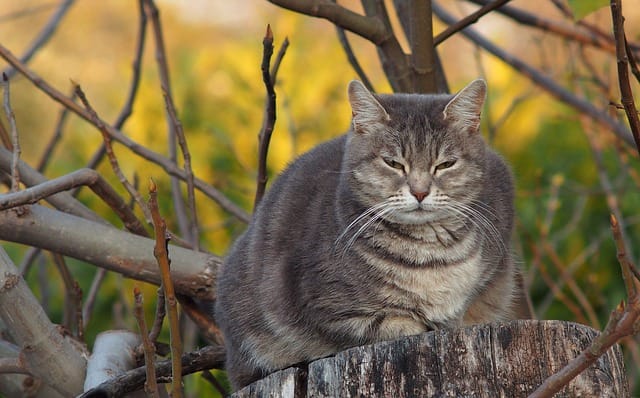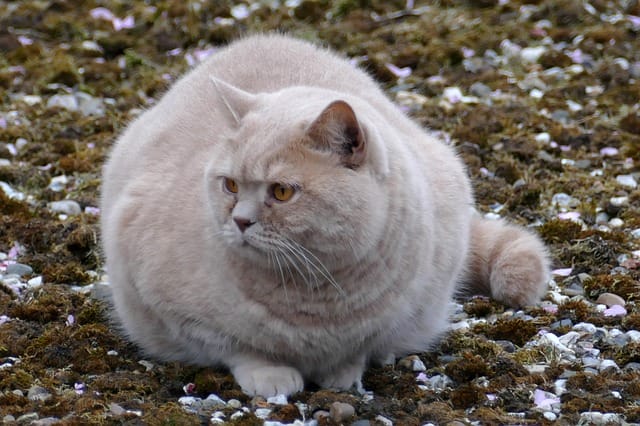
Although many cats are overweight, there are others that are underweight and require to gain weight.
In some situations, your cat may need to put on weight, as well as pointers for how to do so.
The first thing you should do if your cat is underweight is to visit the veterinarian to make sure there aren’t any underlying health problems.
If there are none, then it’s time to put your cat on a weight-gaining diet.
The best pet food for cats that need to gain weight contains 36 percent protein and 20 percent fat.
There are many different ways to feed your cat if it needs to gain weight.
You can mix canned food in with its regular dry food, or you can try putting it on a high-calorie diet.
Some people even use baby foods that contain vegetables and meat because they’re high in protein and vitamins.
Does Your Cat Need to Gain Weight?
There are a variety of reasons why your cat might need to gain weight.
“If you notice your cat losing weight, the most important thing to do is consult with your veterinarian,” according to Catherine Lenox, DVM, DACVIM (Nutrition), Regulatory Veterinary Manager and a Board Certified Veterinary Nutritionist at Royal Canin North America.
It could be because of a disease such as hyperthyroidism, inflammatory bowel disease, or cancer.
If your cat is also losing weight and you can’t figure out why after consulting with the veterinarian, it’s possible that your pet isn’t absorbing nutrients properly.
This may be due to another underlying health issue such as liver or pancreatic problems.
If your cat loses weight rapidly, it might be a symptom of a more severe health condition—which can cause appetite loss and weight loss—including:
- Pancreatitis,
- Liver disease,
- Kidney disease,
- Respiratory or nasal illness,
- Dental problems, and
- Systemic illness such as sepsis.
If your cat reaches a low body score or starts losing weight rapidly, it could be because of something called the refeeding syndrome which occurs when there is insufficient vitamin and mineral intake after a period of malnutrition.
While this condition is rare, it’s possible for severely malnourished cats that are anorectic for a long time.
The refeeding syndrome can cause dangerous heart and metabolic problems as well as bone loss.
When it comes to older cats, “It isn’t normal for a healthy senior cat to be underweight simply because they are old,” Lenox explains.
If your older cat is losing weight, especially if you haven’t altered its diet or feeding amount, you should visit your veterinarian to check for underlying medical problems.
Cats are excellent at hiding health problems, and uncovering health issues can help advise diet choices and feeding amounts, regardless of their age.
“Veterinarians aim to maintain cats in a body condition score of four to five out of nine on every visit, with one being extremely thin and nine being very fat.
The body condition score can be determined at home by feeling the cat’s ribs and seeing how visible they are,” Lenox adds.
What is the ideal amount of food for your cat to maintain healthy weight?

“If your cat is underweight, it may be recommended that you feed it a specific diet to assist with weight gain,” Lenox says.
“Dietary regimens intended for weight gain are calorie-dense, which means a lesser amount of food is required to provide the necessary calories for weight gain.
Because fat contains more calories per gram than proteins and carbohydrates, a diet intended for weight gain should have a higher proportion of fat.”
In certain situations, a temporary or long-term feeding tube may be required to assist the cat is gaining weight.
This form of feeding can also be utilized to “assist reduce stress for pet owners about whether or not their cat will eat and can also be used to give some medicines.”
According to Maryanne Murphy, DVM, Ph.D., DACVIM, Clinical Assistant Professor of Nutrition at the University of Tennessee College of Veterinary Medicine, there can be considerable variation in individual cats’ dietary needs.
“If the cat appears to be eating a sufficient amount of calories for its ideal weight but is still classified as underweight, we generally will increase intake in 10–20 percent increments,” says Murphy.
In some situations, we may even advocate free choice feeding, but it’s essential to track how much the cat consumes.
It’s easy to believe your pet is eating enough when they are free-fed, but if they eat close to the same amount every time and it’s less than what we recommend for their ideal weight, you should reconsider how much you’re feeding your cat.
Once you know how much food your cat requires, determining how often you feed him is the next step.
Herrick advises feeding your cat tiny meals several times a day and providing them with a clean supply of freshwater to drink throughout the day instead of feeding once or twice a day.
5 Tips for Increasing Your Cat’s Weight Naturally
When It comes to assisting your cat is gaining weight, the following suggestions from Lenox and Herrick are a good place to start.
Feed your cat canned food
Canned cat food is richer in taste and smell than dry food, making it more appealing to your pet. All of this extra moisture also helps to fill up your cat’s diet with extra water, making it a win-win for keeping kitty fed and hydrated.
Warm your cat’s food carefully
Your cat may like his or her dinner slightly warmed, not too hot. “A quick zap in the microwave with a splash of water is a great way to give your cat a few extra calories,” says Herrick.
Try hand-feeding your cat
This might also assist in encouraging the cat to eat. Handling and petting your cat may also be beneficial. “If the cat is more engaged with you and feels like it has a little more control, this may promote food intake,” Lenox says.
Change the meal up
Cats have preferences regarding flavor, so vary it up. If your cat habitually consumes chicken, offer a tuna dish instead. Always keep in mind to switch to the new food gradually while avoiding upsetting their stomach.
Inquire about a supplement
Your veterinarian will evaluate if a vitamin or mineral pill, high calorie supplements, or other treatments are required for your cat at this time.
“There are some exceptions to the above, but in general I would say that if your cat is on the thin side, you are better off feeding several small meals throughout the day rather than one or two larger ones,” says Herrick. “This can help with weight gain and also will assist with blood sugar control.”
To increase his chances of gaining weight, Murphy suggests that the cat be fed a high calorie food, either as a canned or dry food, and offered on a free feeding basis.
“Feeding an overweight cat is more difficult because it’s not healthy to simply increase their intake without some type of plan,” says Herrick.
“Decreasing physical activity is key for these cats, even though it might seem cruel to do so.
It’s necessary to make sure the cat isn’t losing muscle mass because fat will help provide energy.”


GIPHY App Key not set. Please check settings